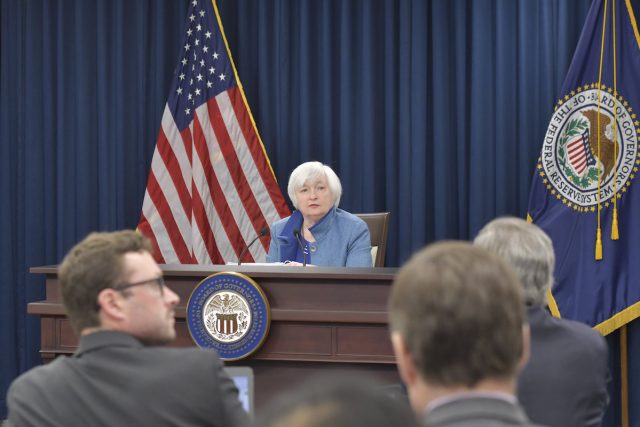Janet Yellen: Crypto-Asset Activities Could Pose Risks to United States Financial Stability
6th October 2022 | Hong Kong
United States Secretary Treasury Janet Yellen has warned of crypto-asset activities posing risks to United States financial stability, which has grown in scale and attracting large amount of retail & institutional investors. Janet Yellen: “Crypto-asset activities could pose risks to U.S. financial stability if their interconnections with the traditional financial system or their overall scale were to grow without adherence to or being paired with appropriate regulation.” Read her remarks below at the Financial Stability Oversight Council Meeting October 3, 2022 | View summary on Digital Asset Financial Stability Risks & Regulation 2022 Report below. Full report here
“ Janet Yellen: Crypto-Asset Activities Could Pose Risks to United States Financial Stability “
Remarks by Secretary of the Treasury Janet L. Yellen at Financial Stability Oversight Council Meeting October 3, 2022

On behalf of the entire Council, I’d like to express my thanks and appreciation for the hard work of our staffs. And I’d like to thank members of the Council for your attention and partnership on this effort. I know that there has been tremendous effort on this report since March.
The Council works to identify, address, and foster resilience to vulnerabilities in the financial system. This includes vulnerabilities arising from new and emerging technologies and sectors.
In April, I delivered a speech on digital assets at American University. I argued that the government should promote responsible innovation – innovation that works for all Americans, protects our national security interests and our planet, and contributes to our economic competitiveness and growth.
Innovation is also one of the hallmarks of a vibrant financial system and economy. But as we have painfully learned from history, innovation without adequate regulation can result in significant disruptions and harm to the financial system and to individuals.
Digital assets have grown significantly in scale and scope over recent years. They have attracted a large amount of capital and interest from both retail and institutional investors. At the same time, we have seen very significant shocks and volatility within the crypto-assets system, particularly over the last year. With the potential for this kind of instability in mind, at our February meeting, the Council named digital assets as one of its key priorities for the year.
The Council’s report we are voting on today finds that the current regulatory framework has helped largely insulate traditional financial institutions from crypto-asset-related financial stability risks. But it states that crypto-asset activities could pose risks to U.S. financial stability if their interconnections with the traditional financial system or their overall scale were to grow without adherence to or being paired with appropriate regulation, including enforcement of the existing regulatory structure.
The report also identifies a number of material gaps in current regulation, and recommendations to address these gaps. Some of these recommendations are focused on actions that Council member agencies can take with existing authorities. Others require Congress to provide new authorities.
This report adds to analysis of digital asset issues that have been covered in other recent reports, including on the future of money and payments; consumers and investor protection; illicit finance; and a framework for international engagement.
In all, these reports provide a strong foundation for policymakers as we work to mitigate the risks of digital assets while realizing the potential benefits. They also provide a valuable addition to the public’s understanding of digital assets.
The Financial Stability Oversight Council’s Report on Digital Asset
Financial Stability Risks and Regulation
The Financial Stability Oversight Council (Council) today released its Report on Digital Asset Financial Stability Risks and Regulation. In March 2022, the Secretary of the Treasury convened the Council to produce the report in response to Section 6 of President Biden’s Executive Order 14067 on “Ensuring Responsible Development of Digital Assets.” The report reviews the specific financial stability risks and regulatory gaps posed by various types of digital assets and provides recommendations to address such risks.
Financial stability risks
Crypto-asset activities could pose risks to the stability of the U.S. financial system if their interconnections with the traditional financial system or their overall scale were to grow without adherence to or being paired with appropriate regulation, including enforcement of the existing regulatory structure.
The scale of crypto-asset activities has increased significantly in recent years. Although interconnections with the traditional financial system are currently relatively limited, they could potentially increase rapidly. Participants in the crypto-asset ecosystem and the traditional financial system have explored or created a variety of interconnections. Notable sources of potential interconnections include traditional assets held as part of stablecoin activities. Crypto- asset trading platforms may also have the potential for greater interconnections by providing a wide variety of services, including leveraged trading and asset custody, to a range of retail investors and traditional financial institutions. Consumers can also increasingly access crypto- asset activities, including through certain traditional money services businesses.
Some characteristics of crypto-asset activities have acutely amplified instability within the crypto-asset ecosystem.
- Many crypto-asset activities lack basic risk controls to protect against run risk or to help ensure that leverage is not excessive.
- Crypto-asset prices appear to be primarily driven by speculation rather than grounded in current fundamental economic use cases, and prices have repeatedly recorded significant and broad declines.
- Many crypto-asset firms or activities have sizable interconnections with crypto-asset entities that have risky business profiles and opaque capital and liquidity positions.
- In addition, despite the distributed nature of crypto-asset systems, operational risks may arise from the concentration of key services or from vulnerabilities related to distributed ledger technology.
These vulnerabilities are partly attributable to the choices made by market participants, including crypto-asset issuers and platforms, to not implement or refuse to implement appropriate risk controls, arrange for effective governance, or take other available steps that would address the financial stability risks of their activities.
Enforcement of the existing regulatory structure
Many nonbank firms in the crypto-asset ecosystem have advertised themselves as regulated. Firms often emphasize money services business regulation, though such regulation is largely focused on anti-money laundering controls or consumer protection requirements and does not provide a comprehensive framework for mitigating financial stability vulnerabilities arising from other activities that may be undertaken, for example, by a trading platform or stablecoin issuer. While some firms in the crypto-asset ecosystem have attempted to avoid the existing regulatory system, other firms have engaged with the existing regulatory system by obtaining trust charters or special state-level crypto-asset-specific charters or licenses.
Compliance with and enforcement of the existing regulatory structure is a key step in addressing
financial stability risks. For example, certain crypto-asset platforms may be listing securities but are not in compliance with exchange or broker-dealer registration requirements. In addition, certain crypto-asset issuers have offered and sold crypto-assets in violation of federal and state securities laws, because the offering and sale were not registered or conducted pursuant to an available exemption. Regulators have taken enforcement actions over the past several years to address many additional instances of non-compliance with existing rules and regulations, including illegally offered crypto-asset derivatives products, false statements about stablecoin assets, and many episodes of fraud and market manipulation. In addition, false and misleading statements, made directly or by implication, concerning availability of federal deposit insurance for a given product, are violations of the law, and have given customers the impression that they are protected by the government safety net when they are not. Further, misrepresentations by crypto-asset firms about how they are regulated have also confused consumers and investors regarding whether a given crypto-asset product is regulated to the same extent as other financial products.
Regulatory Gaps
Though the existing regulatory system covers large parts of the crypto-asset ecosystem, this report identifies three gaps in the regulation of crypto-asset activities in the United States.
- First, the spot markets for crypto-assets that are not securities are subject to limited direct federal regulation. As a result, those markets may not feature robust rules and regulations designed to ensure orderly and transparent trading, prevent conflicts of interest and market manipulation, and protect investors and the economy more broadly.
- Second, crypto-asset businesses do not have a consistent or comprehensive regulatory framework and can engage in regulatory arbitrage. Some crypto-asset businesses may have affiliates or subsidiaries operating under different regulatory frameworks, and no single regulator may have visibility into the risks across the entire business.
Third, a number of crypto-asset trading platforms have proposed offering retail customers direct access to markets by vertically integrating the services provided by intermediaries such as broker-dealers or futures commission merchants. Financial stability and investor
protection implications may arise from retail investors’ exposure to certain practices commonly proposed by vertically integrated trading platforms, such as automated liquidation.
Recommendations
The Council notes that large parts of the crypto-asset ecosystem are covered by the existing regulatory structure. In applying these existing authorities, the Council recommends that its members take into consideration a set of principles and emphasizes the importance of continued enforcement of existing rules and regulations.
To address regulatory gaps, the Council recommends:
- the passage of legislation providing for rulemaking authority for federal financial
regulators over the spot market for crypto-assets that are not securities; - steps to address regulatory arbitrage including coordination, legislation regarding risks
posed by stablecoins, legislation relating to regulators’ authorities to have visibility into, and otherwise supervise, the activities of all of the affiliates and subsidiaries of crypto- asset entities, and appropriate service provider regulation; and - study of potential vertical integration by crypto-asset firms.
Finally, the Council recommends bolstering its members’ capacities related to data and to the
analysis, monitoring, supervision, and regulation of crypto-asset activities. The full report can be viewed here.
Sign Up / Register
Caproasia Users
- Manage $20 million to $3 billion of assets
- Invest $3 million to $300 million
- Advise institutions, billionaires, UHNWs & HNWs
Caproasia Platforms | 11,000 Investors & Advisors
- Caproasia.com
- Caproasia Access
- Caproasia Events
- The Financial Centre | Find Services
- Membership
- Family Office Circle
- Professional Investor Circle
- Investor Relations Network
Monthly Roundtable & Networking
Family Office Programs
The 2025 Investment Day
- March - Hong Kong
- March - Singapore
- July - Hong Kong
- July - Singapore
- Sept- Hong Kong
- Sept - Singapore
- Oct- Hong Kong
- Nov - Singapore
- Visit: The Investment Day | Register: Click here
Caproasia Summits
- The Institutional Investor Summit
- The Investment / Alternatives Summit
- The Private Wealth Summit
- The Family Office Summit
- The CEO & Entrepreneur Summit
- The Capital Markets Summit
- The ESG / Sustainable Investment Summit





































